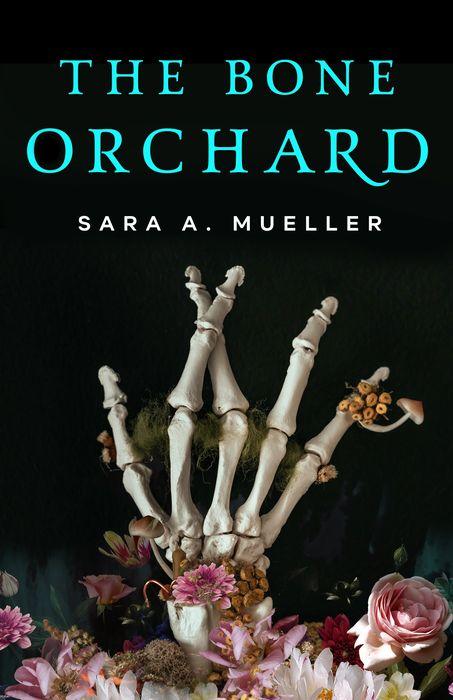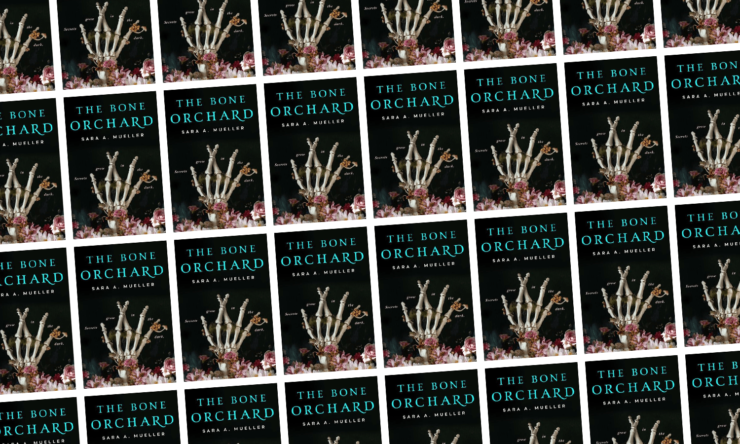One could, if one so desired, probably have a fairly lively argument about whether Sara A. Mueller’s elegant and tempestuous The Bone Orchard is simply fantasy, or if it dips into something more like science fantasy along the way. The story of a madam and her gaggle of “boneghosts” involves mindlocks (which temper and control the tricky power of psychics), vat-grown bodies that are subject to contamination by mold, a valuable substance called “empathy fluid,” and eternal youth in the form of Rejuv, which comes in pill form. All of these things seem to hover on the edge of the permeable boundary between genres, one dainty toe in a pool of magic, one foot resting on slowly turning gears.
The Bone Orchard also feels somewhat historical, for all that it’s set in an entirely fictional world populated with the aforementioned psychics and boneghosts. Mueller’s eye for detail, for building the city of Borenguard and its class-separated inhabitants, makes everything feel as if it’s taking place in a city you know you’ve heard of but can’t quite name. She relies on her readers’ powers of inference and connection, letting her world slowly come into focus—and what a world it is. Divided, sexist, violent, and wracked by the whims of powerful men, Borenguard is all too familiar in some way, though the story Mueller sets within it is fresh and vivid, rich and heartbreaking and deeply intimate.
Charm is a madam; Charm is a witch; Charm is the mistress of Borenguard’s emperor, who can command total obedience thanks to the mindlock in Charm’s temple. The proprietor of Orchard House, her main staff are boneghosts, grown in a vat and given distinctive and relevant names: Pain, Pride, Shame, Justice, Desire. I would really like to tell you more about the boneghosts, about where they come from and how they arrived in this world. But the process of understanding Charm’s relation to them—and to the mysterious Lady—is one of this novel’s primary joys. It’s not a twist or a trick or a bit of cleverness, but the foundation of Mueller’s story, which explores how a woman might change and twist herself in order to endure excessive trauma.
Buy the Book


The Bone Orchard
Mueller is exactly as clear as she needs to be about the nature of that trauma. The Bone Orchard is set in a world at war, and neither nation is faultless when it comes to abusing its psychics, or its leaders abusing their power. There are a lot of ugly things in here, from child murder and sexual abuse to violent beatings and psychic torment. But Mueller is never sensational. Her story is about choices and survival, grief and fear and how a person might be able to grow and take power even under the worst possible circumstances.
It’s also a mystery. On his deathbed, the emperor summons Charm and gives her a task: find out which of the emperor’s sons caused his death, and ensure the crown goes to “someone deserving.” The mindlock guarantees she has to obey. But it can’t control how she goes about solving this mystery, or all the things that happen as the emperor’s largely horrible children vie for a shred of his power. Charm has to do as her emperor commands, but his instruction takes a backseat to the things Charm learns about herself in the process.
The Bone Orchard is more meandering stream than rushing river, and I loved it all the more for it; this book lets you luxuriate in a sense of place and atmosphere, in the city’s bakeries and dress shops, and the nooks and crannies of Orchard House. It is full of intriguing secondary characters, at least one of which, Major Nathair, deserves a book of their own. The pacing occasionally stumbles; some of Pain’s trips out into the world can feel a little repetitive, and Charm’s contest of wills with the Lady isn’t quite as compelling as it might be. But things pick back up every time Charm steels herself to put on her best smile for a customer; every time Nathair turns up in a different outfit, full of secrets; every time a boneghost faces off with Charm, trying to establish herself and her own wishes within their carefully built existence.
This is a book where magic is a physical, visceral thing, where psychic power can wreak havoc on a person’s mind to the point that imposed control might become preferable. Mueller explores ideas about power and control in ways both familiar and unusual: A madam with great influence isn’t a new concept, though Charm herself is decidedly unique, and Borengard’s Firedrinkers are a fascinating military semi-hive-mind, generally anonymous and under psychic control. (Would I also like a book about the Firedrinkers? I would not say no.)
There are no cannibal nuns here, but some of the feel of Mueller’s magic system reminded me at times of Kerstin Hall’s Star Eater. It’s the way bodies are necessary and yet so fragile, and the way trauma and loss sit in the story’s bones—and also in Mueller’s understanding of how her world runs, what it takes to keep a city ticking, to keep people fed and systems functional. Bone magic stories, too, are a particular kind of tale, and this novel resonates on a necromantic frequency with some other recent books. The Bone Orchard doesn’t overlap with Gideon the Ninth or The Bone Witch on a surface level, but deep in the marrow of all three books, there’s a powerful thread of grief, loss, and what we carry—in our bodies as well as our minds.
I would love to see The Bone Orchard among prestige TV’s epic fantasy adaptations—all these rich costumes! Charm with her colorful hair! Intrigue and court politics! The boneghosts and Firedrinkers and streets and gates of Borenguard! Until that happens, though, I suggest you prepare to sink into this one—let it take its time, and take your time with it. It’s an orchard worth strolling through, admiring every branching tree and tempting fruit.
The Bone Orchard is published by Tor Books.
Read an excerpt here.
Molly Templeton lives and writes in Oregon, and spends as much time as possible in the woods. Sometimes she talks about books on Twitter.










